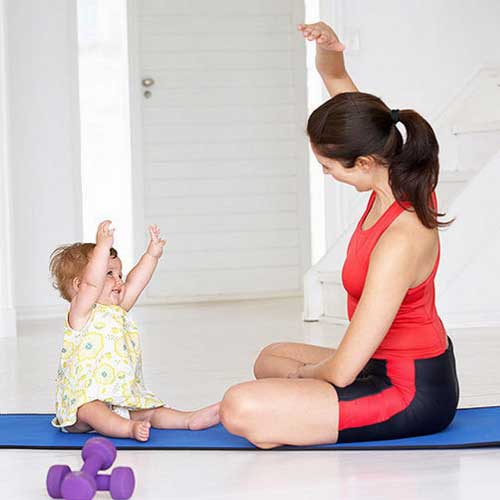The first thought for many women who decide to have a baby is to start an exercise routine and eat a healthy diet. However, before you start increasing your current exercise routine, or begin a new workout plan, take a moment to consider this: research has shown that extreme exercise can negatively affect fertility, and can even inhibit conception! Studies show that regular, light exercise not only helps maintain a healthy body, it also supports reproductive functions; however, too much intense exercise may not only alter your entire menstrual cycle, it can also affect hormonal balance, decrease fertility, and increase the risk of ovulation disorders. It’s all about balance! To keep your body baby-prepared and to maintain a healthy weight, moderate exercise is required.
Excessive Exercising and Fertility
We know that regular, moderate exercise is vital for fertility, but this exercise must be done on a consistent basis and be moderate and low-impact. So, if we know that excessive exercising can affect fertility, the question arises: “What is excessive exercise”? Exercises added on top of your daily workout could well be excessive, and the “no pain no gain” mindset should be avoided at all costs if you are trying to get pregnant. If you overdo your exercise routine your pituitary gland may discourage ovulation, and while this may be frustrating, it’s just your body’s way of protecting you. Basically, your body could well perceive the stress as a reason to discourage fertility.
Maintaining a Good Weight for Fertility
While we know that being obese or overweight can make it difficult to become pregnant, we also know that where fertility is concerned, a bigger cause for concern is being under the “ideal” weight. That’s why it’s important that you understand your BMI (body mass index) and work out an exercise plan to help your body achieve an ideal state for pregnancy. Being above or under a healthy weight can disrupt ovulation and hormone production in your body, making it much harder to conceive. Ideally, you need to have a body fat percentage of between 12% and 30%, and a BMI of between 18.5 and 24.9; however, if you’re unsure about these figures please don’t hesitate to speak to your general practitioner. Your doctor should be able to tailor an appropriate exercise program and adjust your diet to ensure you reach a healthy weight for both conceiving and delivering a healthy baby.
How Exercising Maintains a Healthy Body
When it comes to fertility, moderate exercise can be very helpful in a number of ways. To start with, the right exercise program will improve your stamina and strength, which in turn will guide you through a healthy and safe pregnancy. Exercise also improves blood flow, vitally important for reproduction, and promotes muscle mass, which supports your reproductive organs. Of course, exercise is also renowned for reducing stress, which not only maintains stable hormones for conception, it improves your overall general health.
Don’t Have a Regular Exercise Routine?
If you don’t exercise on a regular basis, or perhaps you’ve never exercised at all, it’s never too late to start! And it’s all so easy! Start with a simple exercise like walking, swimming, cycling, dancing, yoga, tai chi, or Pilates – and make sure you include some stretching. This will give you a base so that you can gradually increase the time and intensity of your exercise regime. Your aim should be to exercise for five days a week for 30 minutes at a time; or alternatively, an hour-long workout three times a week. Because we understand that everyone is different, we do suggest that you consult with either a personal trainer or your local health practitioner to discuss an exercise program designed specifically to promote fertility.
Start Now! Don’t Wait until You’re Pregnant
The reason you should start your fitness program now is that your body should be in great physical shape in the early days of foetal development. Keep in mind that, as a mother, your health has a direct effect on your baby’s health, so the earlier you begin an exercise program and a good eating plan, the better it will be for your baby. And, by starting now you’ll find that your physical activity will become a habit, and you’ll look forward to exercising while you’re pregnant and after the birth of your baby.
Set Realistic Limits
If you’re an athlete and you love working out, you may need to reduce either the length or intensity of your exercise program in order to boost your fertility. An intense exercise program can produce more ammonia and slow down the production of hormones, both of which can negatively affect conception. Try to keep your exercise session under one hour and ensure that you pencil in some rest days. This may be difficult to adjust to in the beginning, but keep in mind that once your baby is born you can always return to your previous exercise schedule.
Exercises that are Fertility-Friendly
Fortunately, there are a few different types of exercise that can have a positive effect on fertility. A moderate cardio regime that consists of swimming, walking, aerobic classes, or jogging, are perfect exercises to get your blood pumping, yet they don’t have an extreme impact. When it comes to building core strength and reducing stress, you can’t go past Pilates and yoga classes. Another great way of building stamina and strength is to lift weights a couple of times a week. Basically, you’re looking for different types of exercises where you’re not overexerted, but just a little out of breath. However, always listen to your body, and don’t overwork your body.
Try a Variety of Activities
The only way to maintain any exercise program is to indulge in activities that you enjoy, so make sure you try a variety of activities. Maybe it’s pouring with rain so you can’t go for a walk outside, but you can certainly go to that Zumba class. Swimming is typically a favourite of pregnant women because it’s zero impact and you get to enjoy that wonderful weightless feeling, particularly during the latter months of pregnancy. Of course, the added bonuses of maintaining an exercise program before, during, and after pregnancy is more energy and a better night’s sleep.
Other activities you can try include prenatal yoga, which can provide many benefits such as reduced stress, improved flexibility and balance, and even help with breathing techniques during labor. If you prefer something more low-key, consider doing some prenatal Pilates. This low-impact exercise can help strengthen your core, pelvic floor, and back muscles.
Walking is another great option, and it’s something you can do almost anywhere. Take a stroll around your neighbourhood or head to a nearby park. If you have a dog, take them along too for some extra company and motivation.
Whatever activity you choose, just make sure you’re comfortable and not overexerting yourself. Listen to your body and don’t push yourself too hard. Remember, the goal is to stay healthy and active, not to become a fitness superstar.
In addition to trying different activities, it’s also important to mix up your routine. Don’t do the same thing every day, as your body will quickly adapt and you’ll stop seeing results. Instead, try to incorporate a variety of activities into your week to keep things interesting and challenging.
By trying a variety of activities and mixing up your routine, you’ll have a much better chance of sticking with your exercise program throughout your pregnancy and beyond. And ultimately, you’ll be doing yourself and your baby a great favour by staying healthy, happy, and active.
Photo Credit: “Why is exercise an inevitable aspect of” (Public Domain) by ekta_10
This post first appeared in 2016. It was last updated in June 2023.
Zoom Baby is a leading supplier of Pregnancy Tests and Ovulation Test Kits





